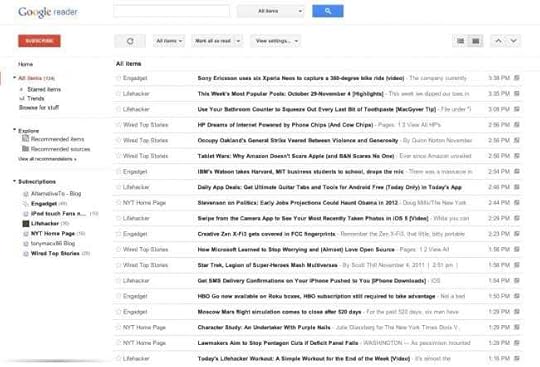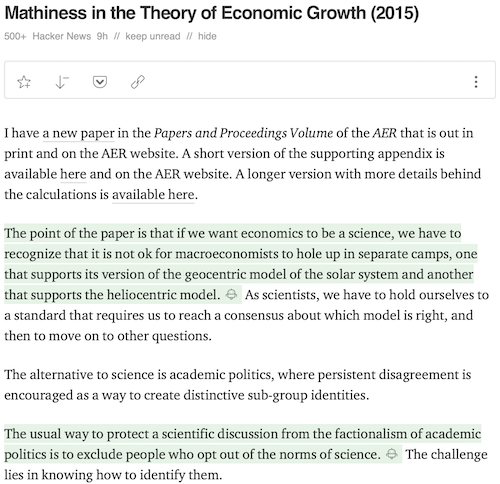It’s Time to Get Back Into RSS

A lot of people who were on the internet in the early 2000’s remember something called RSS. It stands for Really Simple Syndication, and it allowed content creators to publish updates to the world in a well-understood format.
The idea—which seems strange to type out—is that millions of people in the world could create and publish ideas, thoughts, and content…and then people who enjoyed that content would collect sources into a reader, which was called, well, an RSS Reader.
I often wonder if Google could revive democracy by bringing back Reader.

Google Reader, the most missed product in Google’s extensive graveyard
Google Reader was the reader of choice, and it was glorious. People took pride in their curated set of sources, and we wrote a lot about how to best organize your feeds for maximum efficiency.
It was a direct connection between creators and consumers. By adding someone’s feed to your RSS reader you were saying, “Yes, I’d like to subscribe to your interpretation of reality.”
By curating the feeds in your reader, you were curating your view of the world. And that was made up of hundreds or thousands of individual voices.
We’re not sure who struck first—us or them—but we know it was us that scorched the sky.
Morpheus
It’s unclear what exactly destroyed RSS, but Google closing Google Reader definitely didn’t help. Another factor was the rise of aggregation sites like Slashdot, Digg, and Reddit, which seductively took on the burden of surfacing the best content.
So rather than having to curate your own feeds, you just land on a single site and have the “best” content presented to you.

A picture of me getting a story off of Digg in 2005
Reddit is awesome, for sure. And so were the other aggregators. But I think they stole something from us. First, they broke the direct connection between the reader and the creator, making it so that Digg showed you a story, not Kristen—who you’ve been following for years. And second, it removed the need to tend to one’s own input garden.
The less effort it takes to acquire something, the less value it will have to you.
I’m sure social media sites had an effect too, because—like aggregators—they were singular watering holes that guaranteed something exciting when you showed up. The common denominator is the move from more effort to less. It’s like in WALL-E, where we turn into morbidly obese people on hoverchairs being shuttled between stimuli.
Well, it’s time to garden again. It’s time to return to RSS.
Google Reader is still dead, but if I remove my nostalgia glasses, Feedly is probably better now than Reader ever was. It’s what I’ve been using for years now.

Be sure to follow lots of stuff you agree with, and stuff you don’t
I mean cooking as a passion, not as a cheaper alternative to eating out.
I see RSS curation like the practice of cooking one’s own meals. There’s something magical about picking specific ingredients, using custom tools to prepare them, and then consuming the output.
Or—perhaps an even better metaphor—cultivating a bookshelf. With the only difference being that bookshelves are usually constructed using only one’s favorite books, while I think an RSS reader should be designed for “exposure to other” as well.
Just as with any hobby, the effort adds meaning to the output.
The point is that curation of an RSS reader forces one to think about their inputs, and to exercise their values in doing so. Are you building a list of inputs that agree with you? Are you including people who you respect but disagree with? What about people you can’t stand at all?
What you choose to include will not just define how you see the world, but how well you understand other peoples’ perspectives as well.
So I challenge you.
Go sign up for Feedly
Add your favorite news sites
Add your favorite aggregators’ feeds (best of both worlds!)
Add your favorite thinkers and creators’ individual sites
Add every one of your friends’ sites
Add the top news sites of your political opponents
Add the sites from your various hobbies (cooking, cars, electronics, etc.)
Then, as the most important step, stop visiting the New York Times, CNN, Reddit, Hacker News, Lobsters, and every other site you rotate through all day.
Feedly also uses AI to highlight critical sections of the article.
Instead, just open your reader and get the content from there.

A story within Feedly
Not only will this reduce your anxiety and churn from constantly opening and closing various sites, but RSS also shows the content in a standard format, with less to distract you.
If you add .rss to the end of any Reddit URL you get its RSS feed.
Remember, you don’t have to give anything up. You can still have Hacker News, Lobsters, and yes—even Reddit—all in one place.
Summary
Ok, to sum up.
We lost something when we stopped following individual content sources
While Reader is gone, Feedly (and others) have done a good job replacing it
You don’t have to give up the power of the aggregators; just add them as sources
RSS is clutter-free consumption, with fewer ads, no popups, etc
Curating your input garden is a meaningful part of the consumption experience
It’s relaxing to know you only have to check one place rather than N places
Long live RSS.
Notes
Ideally, the return to RSS would be accompanied by the return to blogging. More
Here’s a write-up on the various RSS Reader options out there. More
—
If you get value from this content, you can support it directly for less than a latte a month ($50/year) which also gets you the Unsupervised Learning podcast and newsletter every week instead of just twice a month.
Daniel Miessler's Blog
- Daniel Miessler's profile
- 18 followers



